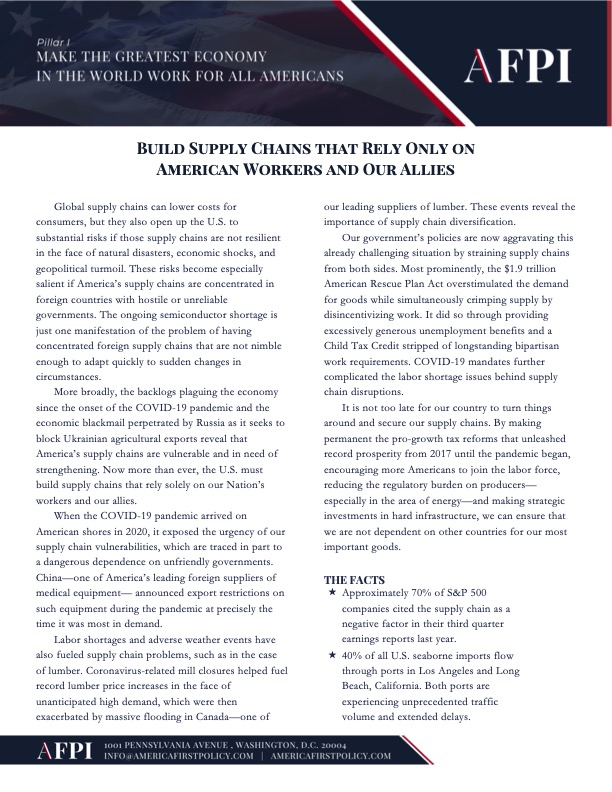Pillar I: Make The Greatest Economy in the World Work for All Americans
Build Supply Chains that Rely Only on American Workers and our Allies
Global supply chains can lower costs for consumers, but they also open up the U.S. to substantial risks if those supply chains are not resilient in the face of natural disasters, economic shocks, and geopolitical turmoil. These risks become especially salient if America’s supply chains are concentrated in foreign countries with hostile or unreliable governments. The ongoing semiconductor shortage is just one manifestation of the problem of having concentrated foreign supply chains that are not nimble enough to adapt quickly to sudden changes in circumstances.
More broadly, the backlogs plaguing the economy since the onset of the COVID-19 pandemic and the economic blackmail perpetrated by Russia as it seeks to block Ukrainian agricultural exports reveal that America’s supply chains are vulnerable and in need of strengthening. Now more than ever, the U.S. must build supply chains that rely solely on our Nation’s workers and our allies.
When the COVID-19 pandemic arrived on American shores in 2020, it exposed the urgency of our supply chain vulnerabilities, which are traced in part to a dangerous dependence on unfriendly governments. China—one of America’s leading foreign suppliers of medical equipment— announced export restrictions on such equipment during the pandemic at precisely the time it was most in demand.
Labor shortages and adverse weather events have also fueled supply chain problems, such as in the case of lumber. Coronavirus-related mill closures helped fuel record lumber price increases in the face of unanticipated high demand, which were then exacerbated by massive flooding in Canada—one of our leading suppliers of lumber. These events reveal the importance of supply chain diversification.
Our government’s policies are now aggravating this already challenging situation by straining supply chains from both sides. Most prominently, the $1.9 trillion American Rescue Plan Act overstimulated the demand for goods while simultaneously crimping supply by disincentivizing work. It did so through providing excessively generous unemployment benefits and a Child Tax Credit stripped of longstanding bipartisan work requirements. COVID-19 mandates further complicated the labor shortage issues behind supply chain disruptions.
It is not too late for our country to turn things around and secure our supply chains. By making permanent the pro-growth tax reforms that unleashed record prosperity from 2017 until the pandemic began, encouraging more Americans to join the labor force, reducing the regulatory burden on producers—especially in the area of energy—and making strategic investments in hard infrastructure, we can ensure that we are not dependent on other countries for our most important goods.
THE FACTS
- Approximately 70% of S&P 500 companies cited the supply chain as a negative factor in their third quarter earnings reports last year.
- 40% of all U.S. seaborne imports flow through ports in Los Angeles and Long Beach, California. Both ports are experiencing unprecedented traffic volume and extended delays.
- Heightened goods consumption arising during the pandemic resulted in the U.S. trade deficit for goods surpassing $1 trillion for the first time in 2021—an increase of 21% over 2020. This increased the reliance of our supply chain on overseas producers.
THE AMERICA FIRST AGENDA
At the federal level, support policies that:
- Permanently allow immediate expensing of investment and keep the corporate income tax rate at a low, globally competitive level.
- Hasten approval of new oil and gas drilling permits on federal land, and open additional areas of federal land to drilling leases.
- Build the Keystone Pipeline.
- Repeal laws and regulations that restrict the use of waterways for transporting goods domestically.
- Expedite the modernization of America’s ports and the creation of liquefied natural gas terminals.
- Reorient trade policies to encourage domestic manufacturing and enhance reshoring and near-shoring.
At the state level, support policies that:
- Facilitate greater labor mobility by outlawing noncompete agreements for most workers and recognizing out-of-state professional licenses.
REFERENCES
Critical Goods and International Trade Dependence in the U.S. by Fernando Leibovici, Federal Reserve Bank of St. Louis (Aug. 2021).
How Much Does the U.S. Rely on Other Countries for Essential Medical Equipment? by Fernando Leibovici, Ana Maria Santacreu, and Makenzie Peake, Federal Reserve Bank of St. Louis
(April 2020).
How We Broke the Supply Chain by David Dayen and Rakeen Mabud, The American Prospect (Jan. 2022).
Pricey Lumber is Back Boosted by Supply Cuts, Labor Shortage by Marcy Nicholson and Jen Skerritt, Bloomberg (Oct. 2021).
Protectionism and Dependence on Imports of Essential Medical Equipment by Fernando Leibovici, Ana Maria Santacreu, and Makenzie Peake, Federal Reserve Bank of St. Louis (April 2020).
Soaring lumber prices add $36,000 to the cost of a new home, and a fierce land grab is only making it worse by Diana Olick, CNBC (April 2021).
Supply Chain Bottlenecks and Inflation: The Role of Semiconductors by Jason Dunn and Fernando Leibovici, Federal Reserve Bank of St. Louis (Nov. 2021).
S&P 500 companies mention ‘supply chain’ and ‘inflation’ on earnings calls at highest rate in at least 10 years by Elisabeth Buchwad,
Market Watch (Nov. 2021).
The Dynamics of International Shipping Supply by Jason Dunn and
Fernando Leibovici, Federal Reserve Bank of St. Louis (Feb.2022).
Trade deficit tops $1 trillion for first time, The Hill (Jan. 2022).
